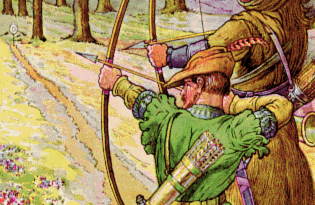Robin Hood: Occupier or Tea Partier?

Photo obtained through Creative Commons.
November 18, 2016
In the past few years, a popular new ideology has emerged, preaching that certain programs be made free of charge, or at least be reduced in cost.
The services include Denmark’s free healthcare system, Germany’s free colleges and Obama Phone free phones, as promoted by the Universal Service Fund. There is some variation on how each individual service will be funded, but the general idea is this: ‘take from the rich and give to the poor.’ This saying comes from the tale of Robin Hood.
According to Howard Pyle’s “The Merry Adventures of Robin Hood,” the tale of Robin Hood took place in the Middle Ages, following its namesake on his adventures against the Sheriff of Nottingham and Prince John.
Robin Hood was a redistributionist who fought against the top 1 percent of society by stealing their money and giving it back to the poor. He did this because the rich were unjustly making their profits off the backs of the middle and lower classes. It was only a matter of time before someone rose up from the oppressed masses and revolted against the persecution of the working people.
But the fundamental question is: who is rich, and how did they get there?
In today’s America, 12 percent of Americans will find themselves in the top 1 percent; 39 percent are in the top 5 percent and 56 percent are in the top 10 percent, all for more than one year, according to The New York Times.
The secret: these taxpayers earned their wealth through hard work, risk-taking and investing in their dreams. They did not, contrary to popular belief, become rich off the backs of workers or by inheriting wealth.
Way back in Medieval England, things were quite different. Those who had money had it because of the tax system in place. Feudalism ensured that there were two classes: nobility and workers, or taxers and taxpayers.
The peasants were forced to live on their lord’s land and give him a share of their crops, according to the Oxford American College Dictionary. They were only allotted a certain portion of their income by the government. This economic system was not a voluntary one, as class was determined by birth and workers did not willingly labor for their rulers. This brings us back to Robin Hood.
The misunderstood hoodlum we all love earned his place in history by stealing from the rich and giving to the poor right? In fact, he took from the tax collector and gave back to the taxpayer.
So Robin Hood was not a redistributionist in the modern sense. He did not advocate for “taking from the rich and giving to the poor.” Instead, he took from the robbers and gave back to the robbed. In modern times, Robin Hood would undoubtedly be considered a capitalist, advocating for less government taxation and freer markets.




Matt Miller • Mar 17, 2017 at 1:32 pm
Will Dean, you are a master of satire. I love your articles, I can’t wait them in every Inkblot issue!